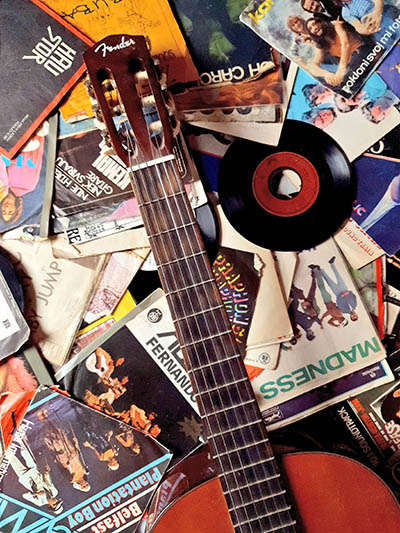Navigating the blues
Well, I don’t want nobody who won’t dive for dimes
I don’t want no speedballs ‘cause I might die tryin’
Throw me a line, show me a sign
‘Cause there’s a fat man in the bathtub with the blues
I hear you moan, I hear you moan, I hear you moan
Lowell George & Little Feat, “Fat Man in the Bathtub”
I’ve long been interested in the role music plays in our culture, its historical basis, its racial context, its physical implications for human beings. Looking into the blues style provided me with a basis for tying a number of these matters together.

Singer Steve Earle says that the blues are his friends because he knows he can always count on them, and no matter what happens in his life, he’ll never lose them.
What are these things we call “the blues?” Where did they originate? Do they have a racial history? How did they become such an important element in our country’s culture?
Although little is known about the exact origin, the blues seem to have been born in Africa, which ethnomusicologist Gerhard Kubik calls the birth bed, aka the “cradle of the blues.” To be slightly more specific about regional origin, according to film-maker Martin Scorcese, West Africa produced the DNA of the blues. A tribe from that region, the Jola of Senegambia, focused on a lute-like instrument, the akoting, to provide the musical basis for the blues and was the instrumental link between African and African-American music.
White America seems to think of the blues as the musical reflection of slavery in this country. There is a close comparison between it and “field hollers.”
Field hollers were assumed to have laid the foundation for the blues. They were the way the slaves in the South expressed themselves musically, and an interpersonal communication among those tied together in chain gangs. Historian Kubik traced field hollers back to the Muslim slaves who came here from West Africa.
Although field hollers were common, the “spiritual” was another influential precursor to the blues. Given its basis in religious belief, the spiritual carried a positive tone that the working beat of hollers did not. Spirituals drew upon religion. Spirituals attempted to bring heaven to earth, as the blues played upon a less positive nature of mankind. “Don’t give me Heaven, because I’ve got the Blues.”
In the early decades of the 20th century, the blues were taken over by prominent women singers. Mamie and Bessie Smith, Ma Rainey and Victoria Spivey were among the better-known female vocalists who sang the blues.
Perhaps ironically, country music and the blues prospered in the southern United States. The two genres promote different lifestyles, however. One is race-based music, the other is hillbilly, and those who espouse the latter may have contributed to the racism described by the former.
Then there is the adoption of the blues by white musicians. Rowland Salley wrote a song titled “Killing the Blues,” recorded by John Prine, and later by Robert Plant and Alison Krause. Mose Allison sang about the white man stealing the blues. Minnesota musicians Dave (Snaker) Ray, (Spider) John Koerner and Tony (Little Son) Glover cut an album called “Blues, Rags and Hollers” that contained several songs that fell into the blues category.
These white musicians adopting blues as their musical tongue gave a certain credence to the blues musical style without destroying its multiracial-based character. It fits in more than one social sphere of humanity or one culture. Anyone can sing the blues.
The blues have long been the basis for feelings. They have a history, coming to this country with the slave trade, and they gave slaves a musical expression of their racial inequality in a non-Black America.
This basis again connects music to culture through a physical design. However, that is another study.
So, while that “fat man in the bathtub with the blues” may be moaning over his situation, he is only dejected enough to chase that situation down the street. I hear him coming now, singing the words of Johnny Cash, who urges us to use music wisely: Get rhythm when you get the blues!

